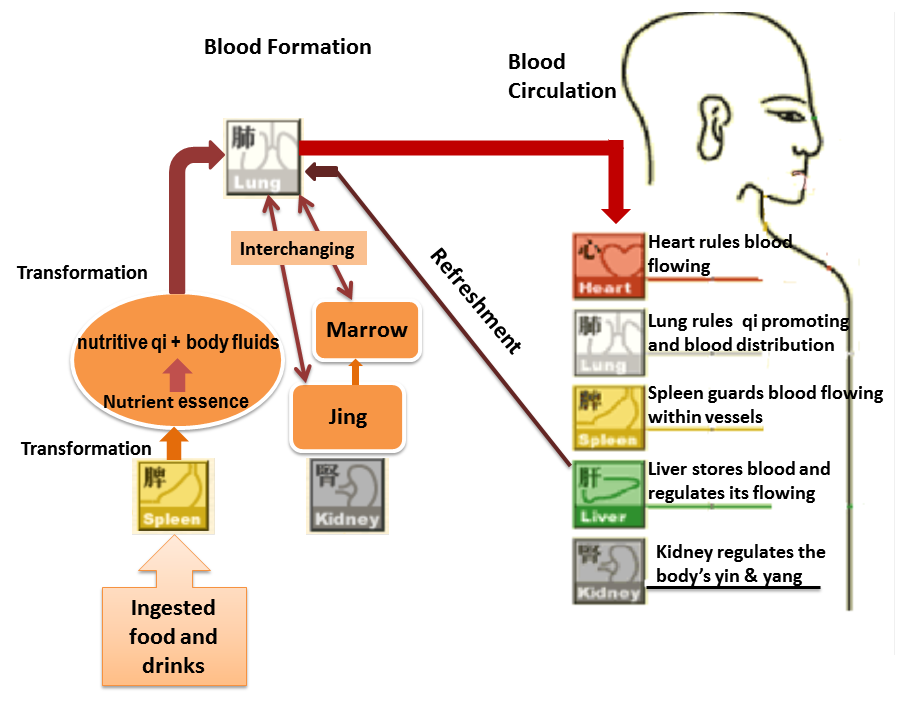Blood from a TCM Perspective
In western medicine, blood is composed of red blood cells, white blood cells, platelets, nutrients, proteins, electrolytes and water. Its functions are based on the characteristics of these individual components. Some of these functions include distributing hormones, carrying oxygen and energy (glucose) and supporting the immune system.
Instead of studying things at a cellular or constitution level, traditional Chinese Medicine (TCM) focuses on the body as a whole. Blood is viewed simply as the red fluid inside the blood vessels that provides nutrition for the body. The nutrients transported by blood are not restricted to physical materials; they can also be extended to anything that provides nourishment to the body.
Origin of blood
Blood is mainly composed of nutritive qi and body fluids, which are originated from nutrient essence transformed by the spleen and stomach. That is why TCM claims that spleen and stomach are the sources of qi and blood formations. Eating a balanced and healthy diet is extremely important, because of the spleen's role in the production of qi and blood. First, digested food and drinks turned into nutrient essence through the stomach and spleen's transforming functions, the nutrient essence will further transformed into nutrient qi and body fluids. The spleen then transports the nutrient qi and body fluids upwards to lung, where they combined and turned into blood and start circulating throughout the body. The lung is also the place for the circulating blood to return and refill with fresh air and nutrients. From this, TCM says that the lung meridian is the beginning in the circulation of the twelve regular meridians.
Another source of blood comes from essence stored in kidney. Since kidney essence and blood are interchangeable, and so essence is also an important substance for blood formation. Besides, kidney essence can transform into bone marrow, thus bone marrow is also responsible for providing blood.
To sum up, substances such as nutrient essence, nutrient qi, body fluids, kidney essence and bone marrow are the material basis for blood formation, and the formation process is through a combined action of organs. In case if any of these factors becomes abnormal, blood deficiency will occur. TCM treatment for blood deficiency may be targeted on multiple factors, e.g. tonifying kidney, tonifying spleen, nourishing liver or replenishing essence etc.
Functions of Blood
Blood is mainly responsible for nourishing and keeping the body moist. Internally, it circulates throughout the organs and tissues, and externally, it flows to skin, muscles, bones and tendons, in order to keep them function properly. 1. Providing nutrients for organs, tissues and meridians
Body parts rely on the nourishment of blood to perform their functions and sustain life. With sufficient nourishment from the blood, organs and tissues can function normally, resulting in a healthy glow in the skin, cheeks, and hair. Nails, muscles and bones also rely on blood nourishment to remain strong and healthy. When there is insufficient blood formation or persistent bleeding, individuals may present a sallow complexion, skin dryness, withered hair, thin muscles, weakened joints or limbs, frequent cramps, and even weakened organs.
2. Maintaining healthy body movement and sensation
The Yellow Emperor’s Classic of Internal Medicine says: "Having received sufficient blood, the liver can support healthy eyesight, the feet can walk, the palms can grasp hold of things, and the fingers can pick up things." This illustrates the important role of blood to the body movements and sensations. If blood is deficient, dizziness, blurred vision, night blindness, ringing in the ears (tinnitus), limb weakness and numbness, cramps in the limbs, and even muscular wasting can occur.
3. Aiding the mind and mental activities
A good blood supply is also important for mental health. With sufficient blood nourishment, a clear mind, sharp senses, good spirit, fast thought processes and swift reaction times are possible. On the other hand, deficiency of blood can lead to a cloud mind, short span of concentration, slow mental reactions, poor memory, poor sleep and easy to panic. In serious cases, there may have dream-disturbed sleep, irritability, illusion, and even mental disorders and psychiatric diseases. Since blood is important for mental activities, individuals who are mentally overloaded tend to develop blood deficiency, especially in a state of heart blood deficiency.
Circulation of blood
Blood flows continuously in the vessels to nourish the entire body. A normal blood circulation relies on mutual coordination of the organs, meridians and vessels. Some of the organs are playing more actively in the circulation of blood. For example, heart pumping provides the source of powder for blood flowing; lung and liver decide how and where the blood is flowing; liver and spleen keep the blood flowing properly within the vessels and also regulate the amount of blood flowing in the peripheral body; a smooth and intact vessel system and the condition of blood itself are also influential to blood circulation. Abnormalities in blood flowing can be showed as a sluggish flow, a rapid flow or blood escaping out of the vessels. TCM treats these conditions from a holistic approach, physicians not only consider the blood flowing problem, but also will clarify the cause, developing mechanism, disharmony pattern and involved organs, so as to design a remedy with desirable result.



